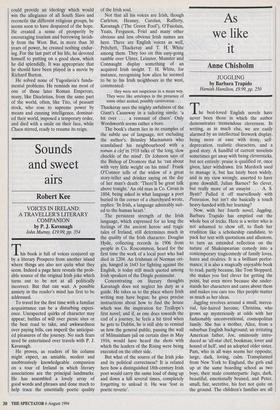Sounds and sweet airs
Robert Kee
VOICES IN IRELAND: A TRAVELLER'S LITERARY COMPANION by P. J. Kavanagh John Murray, £19.99, pp. 354 This book is full of voices conjured up by a literary Prospero from another island where things are also not quite what they seem. Indeed a page here reveals the prob- able source of the original Irish joke which turns out to be not at all politically incorrect. But that can wait. A possible anxiety in the reader's mind has first to be addressed.
To travel for the first time with a familiar acquaintance can be a disturbing experi- ence. Unexpected quirks of character may appear; battles of will over picnic sites or the best road to take, and awkwardness over paying bills, can imperil the anticipat- ed pleasures of the journey. No such fears need be entertained over travels with P. J. Kavanagh.
He proves, as readers of his column might expect, an amiable, modest and unobtrusively knowledgeable companion on a tour of Ireland in which literary associations are the principal landmarks. He has assembled a lovely array of good words and phrases and done much to help trace the essentially poetic quality of the Irish soul.
Not that all his voices are Irish, though Carleton, Heaney, Carolan, Rafferty, Kavanagh (`The Green Fool'), O'Faiolain, Yeats, Ferguson, Friel and many other obvious and less obvious Irish names are here. There are English voices as well, Pritchett, Thackeray and T. H. White among them. They too on this easy-going ramble over Ulster, Leinster, Munster and Connaught display something of an acquired Irish insight. T. H. White, for instance, recognising how alien he seemed to be to his Irish neighbours in the west, commented: ... they were not suspicious in a mean way.
They were like antelopes in the presence of some other animal, possibly carnivorous . . Thackeray sees the mighty awfulness of the Giant's Causeway in a tailoring simile: 'a bit over . . a remnant of chaos'. Only Wordsworth seems rather a bore.
The book's charm lies in its examples of the subtle use of language, not excluding the author's. Brinsley Macnamara who scandalised his neighbourhood with a roman a clef in 1918 talks of 'the long, slow chuckle of the mind'. Dr Johnson says of the Bishop of Dromore that he 'ran about with very little weight on his mind'. Frank O'Connor tells of the widow of a great story-teller and drinker saying on the day of her man's death: 'There'll be great talk above tonight.' An old man in Co. Cavan in 1804, being asked in what language a poet buried in the corner of a churchyard wrote, replies: 'In Irish, a language admirably suit- ed to the human heart.'
The persistent strength of the Irish language, which expressed for so long the feelings of the ancient heroic and tragic tales of Ireland, still determines much in the quality of the Irish character. Douglas Hyde, collecting records in 1906 from people in Co. Roscommon, heard for the first time the work of a local poet who had died in 1204. An Irishman of Norman ori- gin, hanged in 1643 for fighting against the English, is today still much quoted among Irish speakers of the Dingle peninsular.
Concentrating on literary thoughts Kavanagh does not neglect his duty as a guide. He takes us to the place where Irish writing may have begun; he gives precise instructions about how to find the house which was the inspiration for Trollope's first novel; and if, as one does towards the end of a journey, he feels a bit tired when he gets to Dublin, he is still able to remind us how the general public, passing the wall of Milmainham jail on certain days in May 1916, would have heard the shots with which the leaders of the Rising were being executed on the other side.
But what of the source of the Irish joke and its political correctness? It is related here how a distinguished 18th-century Irish poet would carry the same load of dung up and down a hill several times, completely forgetting to unload it. He was 'lost in poetic reverie'.


















































 Previous page
Previous page